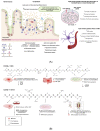ApoE Mimetic Peptides to Improve the Vicious Cycle of Malnutrition and Enteric Infections by Targeting the Intestinal and Blood-Brain Barriers
- PMID: 37111572
- PMCID: PMC10141726
- DOI: 10.3390/pharmaceutics15041086
ApoE Mimetic Peptides to Improve the Vicious Cycle of Malnutrition and Enteric Infections by Targeting the Intestinal and Blood-Brain Barriers
Abstract
Apolipoprotein E (apoE) mimetic peptides are engineered fragments of the native apoE protein's LDL-receptor binding site that improve the outcomes following a brain injury and intestinal inflammation in a variety of models. The vicious cycle of enteric infections and malnutrition is closely related to environmental-driven enteric dysfunction early in life, and such chronic inflammatory conditions may blunt the developmental trajectories of children with worrisome and often irreversible physical and cognitive faltering. This window of time for microbiota maturation and brain plasticity is key to protecting cognitive domains, brain health, and achieving optimal/full developmental potential. This review summarizes the potential role of promising apoE mimetic peptides to improve the function of the gut-brain axis, including targeting the blood-brain barrier in children afflicted with malnutrition and enteric infections.
Keywords: apoE mimetic peptides; blood-brain barrier; environmental enteric dysfunction; gut-brain axis; intestinal inflammation; malnutrition.
Conflict of interest statement
The authors declare no conflict of interest. M. P. Vitek is a principal in Cognosci, Inc., which has ownership rights to selected apoE-mimetic peptides.
Figures




References
-
- Rogawski McQuade E.T., Scharf R.J., Svensen E., Huggins A., Maphula A., Bayo E., Blacy L., de Souza P.P.E., Costa H., Houpt E.R., et al. Impact of Shigella infections and inflammation early in life on child growth and school-aged cognitive outcomes: Findings from three birth cohorts over eight years. PLoS Negl. Trop. Dis. 2022;16:e0010722. doi: 10.1371/journal.pntd.0010722. - DOI - PMC - PubMed
-
- Lima A.A.M., Kvalsund M.P., de Souza P.P.E., Figueiredo Í.L., Soares A.M., Mota R.M.S., Lima N.L., Pinkerton R.C., Patrick P.P., Guerrant R.L., et al. Zinc, vitamin A, and glutamine supplementation in Brazilian shantytown children at risk for diarrhea results in sex-specific improvements in verbal learning. Clinics. 2013;68:351–358. doi: 10.6061/clinics/2013(03)OA11. - DOI - PMC - PubMed
Publication types
Grants and funding
LinkOut - more resources
Full Text Sources
Miscellaneous

